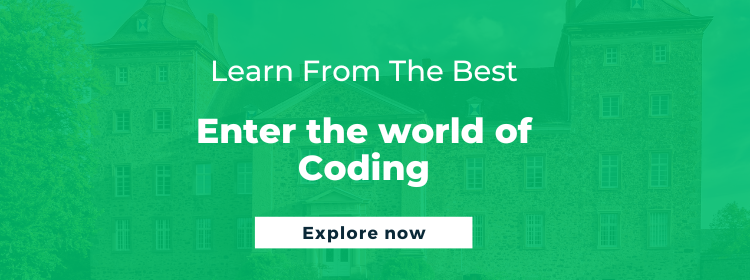What is Full-Stack Development? Your Guide for a Successful Career

- What is the Role of a Full Stack Developer?
- What are the Essential Skills for a Full-Stack Developer?
- How Does Full-Stack Development Differ From Front-End and Back-End Development?
- What are the Advantages of Being a Full-Stack Developer?
- How Can One Start a Career in Full-Stack Development With Emeritus?
In today’s dynamic digital landscape, full-stack development has evolved to represent the all-encompassing process of creating websites and applications. This multifaceted approach, which includes both front-end and back-end development, has gained prominence as technology advances at an unprecedented pace. As our world undergoes rapid digital transformation, the demand for proficient full-stack developers is surging. According to the US Bureau of Labor Statistics, web development and digital design are projected to witness a remarkable 16% increase in employment opportunities from 2021 to 2031, underscoring the pivotal role of full-stack development in today’s job market. In this guide, we explore this particular career in-depth, delving into various aspects to provide a comprehensive grasp of this ever-evolving field. Throughout this guide, we will cover the following essential topics:
- What is the Role of a Full-Stack Developer?
- What are the Essential Skills for a Full-Stack Developer?
- How Does Full-Stack Development Differ From Front-End and Back-End Development?
- What are the Advantages of Being a Full-Stack Developer?
- How Can One Start a Career in Full-Stack Development With Emeritus?
What is the Role of a Full Stack Developer?
 Full-stack development encompasses the comprehensive creation of websites and applications across various platforms. It is a specialization within software development that involves a range of roles and responsibilities, including front-end development (user interface and user experience), back-end development (server-side logic and database management), mobile application development, game development, and more.
Full-stack development encompasses the comprehensive creation of websites and applications across various platforms. It is a specialization within software development that involves a range of roles and responsibilities, including front-end development (user interface and user experience), back-end development (server-side logic and database management), mobile application development, game development, and more.
Furthermore, full-stack developers excel at managing both the front-end and back-end aspects of application development. They also handle diverse responsibilities, which include system engineering, database administration, server management, Application Programming Interface (API) development, architecture design, and client communication. All of these skills are essential for crafting complete and functional products. Let’s take a look at 10 key roles and responsibilities of a full-stack developer:
- Developing and maintaining web services and interfaces that enable seamless user interaction with applications.
- Contributing to both front-end development and back-end development processes, thus ensuring the cohesive functioning of the entire application.
- Crafting new product features and developing APIs to enhance application functionality and user experiences.
- Designing the complete architecture of applications with a focus on user experience, user interaction, as well as the implementation of dynamic and responsive design principles.
- Conducting tests, troubleshooting software, and resolving bugs to maintain optimal performance and reliability.
- Building and managing servers and databases, ensuring the necessary functionality and data storage required for application operation.
- Collaborating seamlessly with cross-functional teams and project managers on various projects and sprints to align development efforts with overall objectives.
- Ensuring cross-platform compatibility means a smooth experience on various devices, including mobile phones.
- Offering valuable suggestions and solutions for continuous improvement, efficiently adding or removing features as needed to meet evolving requirements.
- Staying up-to-date with the latest developments in technology, programming languages, and web development methodologies to efficiently adapt to the ever-changing landscape of digital innovation.
What are the Essential Skills for a Full-Stack Developer?
The following are the required skills for a full-stack developer:
Front-End Skills
- HTML
- CSS
- JavaScript
- Familiarity with front-end frameworks such as React, jQuery, and Angular
Back-End and Database Skills
- API creation and consumption
- Knowledge of back-end languages such as Java, Ruby, C#, PHP, or Python
- Familiarity with database management systems (DBMS) such as MySQL (Structured Query Language), PostgreSQL, MongoDB, etc
- Object-Oriented Programming (OOP)
- Knowledge of both SQL (relational databases) and NoSQL (non-relational databases) as per project needs
Soft Skills
- Leadership
- Analytical skills
- Adaptability
- Problem-solving
- Effective communication
- Teamwork and collaboration
- Management skills
ALSO READ: The 8 Best Tools and Frameworks for Full-Stack Web Developers
How Does Full-Stack Development Differ From Front-End and Back-End Development?
Full-stack, front-end, and back-end development are distinct facets of web development, each with its unique focus and responsibilities. Front-end development primarily concerns itself with the user interface and the visual elements of a website or application that users directly interact with. On the other hand, back-end development revolves around the internal architecture and server-side operations that power the application behind the scenes.
Furthermore, full-stack development, as the name implies, encompasses both front-end and back-end development, spanning the entire spectrum of web development. Additionally, full-stack developers can seamlessly transition from designing the user interface and handling client-side scripting to configuring servers, managing databases, and implementing server-side logic. In essence, they serve as intermediaries bridging the gap between the front and back end, ensuring smooth communication between these two crucial aspects of web development.
ALSO READ: Navigating the Mobile App Development Landscape: Top 5 Trends and Frameworks
What are the Advantages of Being a Full-Stack Developer?
 Now that you have gained familiarity with the realm of full-stack development, let’s explore some of the key advantages of being a full-stack developer:
Now that you have gained familiarity with the realm of full-stack development, let’s explore some of the key advantages of being a full-stack developer:
1. High Demand
Firstly, full-stack development ranks among the most in-demand professions in the IT industry, with a projected growth rate of 16% by 2031. This robust demand places full-stack development among the most sought-after career choices in the technology sector.
2. Lucrative Salary
Full-stack developers enjoy attractive salary benefits due to their ability to work across the entire spectrum of software development, encompassing both back-end programming and front-end design. In the US, the average annual salary for a full stack developer is $127,835, as reported by Indeed. Additionally, salary prospects can vary based on experience, with junior full-stack developers earning approximately $105,270 per year, while those with three to five years of experience command an average of $155,236 per year.
3. Creative Autonomy
Opting for a career as a full-stack developer offers creative flexibility. Such professionals are known for their versatility, being proficient in handling various aspects of a project. Moreover, this versatility allows one to adopt a holistic approach to software development. Thus, it offers the opportunity to shape both the front-end and back-end aspects of projects, nurturing a sense of creative ownership and driving innovation.
ALSO READ: Why You are Not Among the Top 1% Coders, Yet!
How Can One Start a Career in Full-Stack Development With Emeritus?
In conclusion, the world of web development is in a constant state of evolution. Without a doubt, full-stack developers play a pivotal role in this dynamic landscape. Furthermore, their ability to adapt, innovate, and stay current with the latest advancements is paramount to their success. So, if you are looking to learn more and advance your career in full-stack development, consider exploring the extensive catalog of online coding courses at Emeritus.
Write to us at content@emeritus.org






